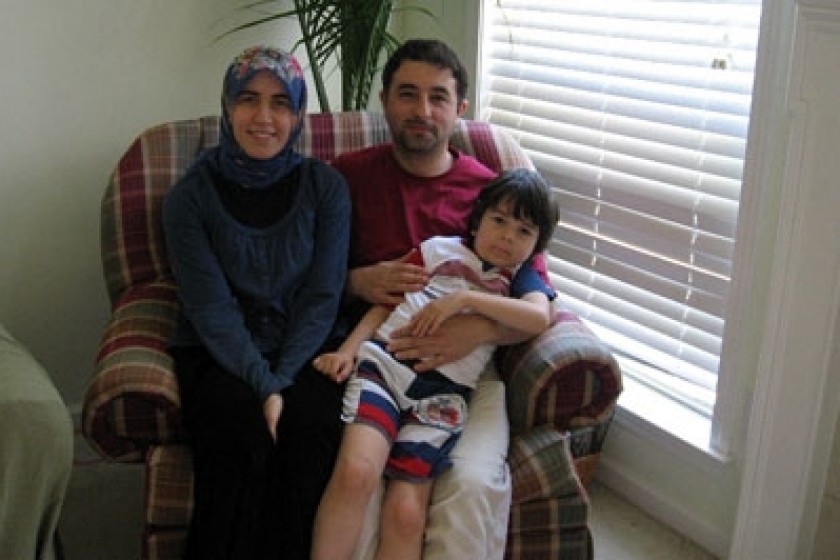
Aysha Prays for Innocent Victims on April 24
Aysha’s passport identifies her as a Turk by nationality but Armenian blood flows through her veins. Her great-grandfather was an Armenian from Mardin. His son was the only survivor of the family.
In the 19th century, Mardin had a population of some 20,000 of which 1/3 was Armenian. By 1914, the overall population had risen to 25,000 with only 1,500 Armenians. The rest were Turks, Kurds, Assyrians and Arabs. In 1915, those Armenians not driven into exile or massacred became Arab speakers.
I met Aysha’s family during a recent trip to the States. The meeting was in the framework of the State Department’s "International Visitor Leadership Program".
Her head and body were totally covered. Her Turkish husband, Ferhat, told our group of five reporters and two translators from Armenia, that Aysha had heard about our trip to the States and wanted to meet us.
Ferhat arrived in the States ten years ago to get and MBA. He had received a green card while a student. After graduating, he returned to Turkey, married Aysha, and then brought the family to America. Yousef, their five year-old son was born in the U.S.
Ferhat knew that Aysha was part Armenian when they married. Her grandfather was four when the massacres of Armenians started. The boy’s parents left him with a Turkish neighbour and fled. They hoped to return one day and reclaim their child. That never happened, they disappeared without a trace.
Ferhat’s great-grandfather was a Muslim cleric who told his descendants that many Armenians took refuge in his house.
"You can’t condemn all Turks for the deeds of a few bad ones. I know what happened at the time based on what my grandfather related. Those things happened to my wife’s relatives," Ferhat said.
Ferhat believes that Armenians and Turks must meet face to face and not only through the media since it often distorts reality. "I am glad to have met you. I learnt certain things. After all, we are brothers and we should sit down and get to know one another," Ferhat said.
He said that the Genocide issue would only be resolved when the two countries recognize their mistakes – by Turkey erecting a memorial to Armenians and the Armenians doing the same at Tzitzernakaberd for Turkish victims.
"The two sides must admit that both have suffered. The innocent who were murdered are still alive in heaven. We should let them rest in peace. I know that my grandfather did nothing wrong back then. Even if we accept that he treated Armenians badly, that’s his sin, not mine. It’s the same for Armenians. You are my brothers and I openly tell you that I love you all," Ferhat explained.
Ferhat said that one day he would like to bring his son to Armenia. "My son should have the possibility in Armenia to openly state that he is a Turk, even though he also has Armenian blood. He should feel at home there. The same with your son when he goes to Turkey," added Ferhat.
He believes that Turkish-Armenian rapprochement should be based on economic development and that politics should be shunted to the side. Both peoples should force their governments along this path and make compromises.
Ferhat noted that twenty years ago everyone in Turkey would say that all their neighbours are enemies. He pointed out the case of Syria and that relations have greatly improved.
"The same should happen between Turkey and Armenia, Armenia and Azerbaijan. I am truly sorry that the Young Turks did those things to Armenians. It was the height of stupidity. If my Armenian brothers continued to live in Turkey we’d be a developed nation today like America. I would have stayed in my country to work. During the Ottoman period, Armenians were more educated, had money and were traders. We lost those people and that money. Our country lost its jewels, one being my wife’s grandfather," Ferhat told us.
Aysha also doesn’t want any government to decide who she can or cannot meet and become friends with.
"I would like to meet Armenians and all my neighbours. Why should I have to wait for the government to decide," she says.
Regarding April 24, the day when Armenians commemorate the 1915 Genocide, Aysha told me she too prays for the innocent victims and didn’t rule out the possibility of one day doing so at Tzitzernakaberd, to pray for the repose of her Armenian forbearers.
"I believe the day will come when Armenians and Turks will sit down together and discuss the past," she said.
 Videos
Videos Photos
Photos
Comments (11)
Write a comment